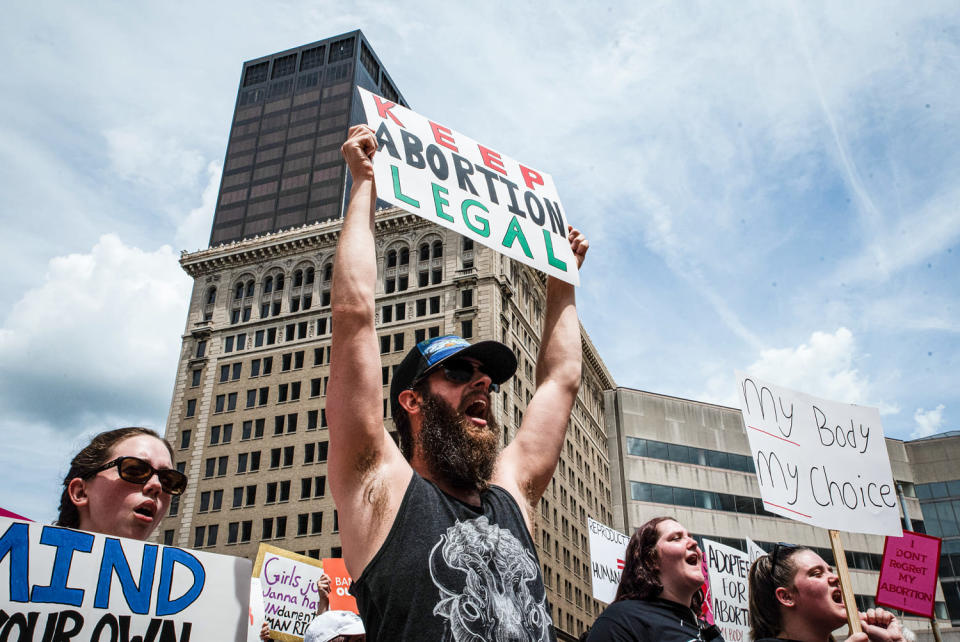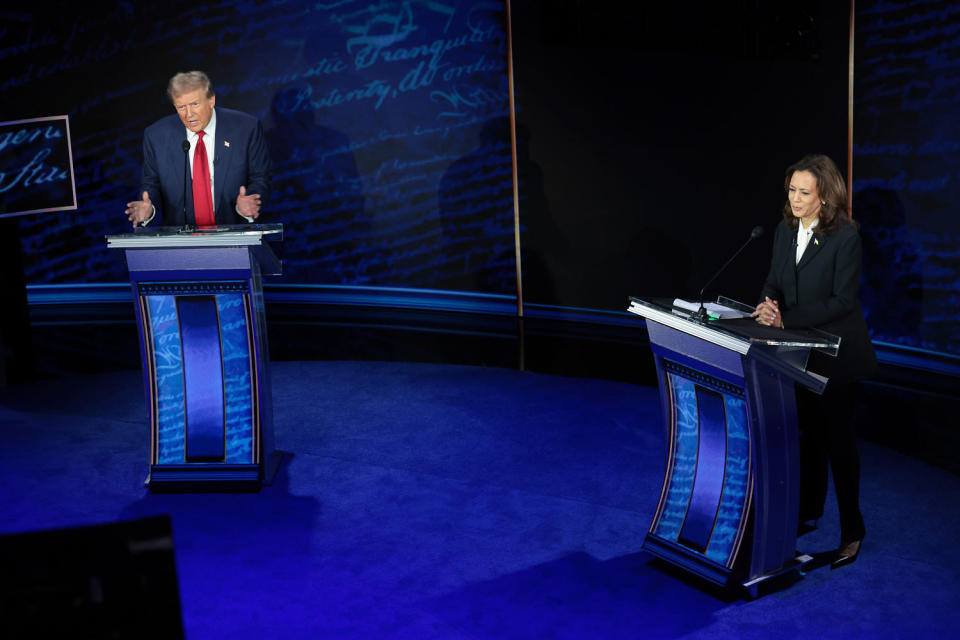New focus groups of skeptical young men planning to vote in this fall’s most critical battleground states illustrate how, for those voters, it’s all about Donald Trump.
The former president has been the dominant figure in American politics and culture since they were teens — or even earlier than that, for some of them. Those leaning toward Vice President Kamala Harris described their choice as more of a vote against Trump than a demonstration of support for her — “the lesser of two evils” or a “step in the right direction, even if it’s a small step.”
By contrast, those leaning toward Trump were far more likely to describe their vote as affirmative support for Trump, reminiscing about the “prosperity” and “stability” they associate with his first term in conversations as part of the NBC News Deciders Focus Group, produced in collaboration with Syracuse University and the research firms Engagious and Sago.
Polling has found a significant gender gap in the race, with Trump holding the upper hand among men and Harris among women. And while Democrats have long performed better among younger voters, the gender gap persists with that group, too: This month’s NBC News Stay Tuned Gen Z Poll powered by SurveyMonkey found Harris leading among Gen Z women by a much wider margin, 30 points, than her 4-point edge over Trump among Gen Z men (within the margin of error).
The two campaigns have been vocal about their attempts to target young men — Trump through the world of influencers and combat sports and Harris through targeted ads and the constant refrain about vice presidential nominee Tim Walz’s past as an assistant football coach. And considering those voters live in Pennsylvania, Michigan and Wisconsin, states regularly decided by small numbers of voters, the ultimate margin among them could prove pivotal.
A distinct difference emerged in how those voters ultimately ended up preferring each candidate. Not one of the Harris-leaning voters is voting because he is proactively pro-Harris.
“Young male Harris leaners were so traumatized by Trump 1.0 they’re desperate to avoid a sequel, while young male Trump leaners recall Trump 1.0 so fondly they yearn for a repeat,” said Engagious President Rich Thau, who moderated the sessions.
That trend was clear throughout the two focus groups, one with seven Harris-leaning voters under 30 years old and a second with eight leaning toward Trump.
“The endorsement of Kamala Harris seems more like a rejection of Donald Trump and the current Republican Party. It comes from a few, either you call them beliefs or topics that I feel strongly about, like LGBT rights, reproductive rights. So it makes it impossible to support anyone currently in the Republican Party,” said William C., 29, of Morton, Pennsylvania.


Three young men from Pennsylvania — Jake T., 26, Noah H., 25, and John M., 23 — all used the term “lesser of two evils” to describe their choices, while another, Andrew H., said he was choosing who would “enact less damage.”
“Kamala Harris is a step in the right direction, even if it is a small step. I extremely dislike MAGA politics, and a lot of the Republican Party is basically that extremeness, and I dislike it a lot,” John M. said. “It does kind of fall into the lesser of the two evils, but I feel like there’s a little bit more promise with her.”
The Trump-leaning voters were more mixed — four said they are proactively supporting Trump, and the other four said they are primarily opposing Harris.
“Selfishly speaking, my life was better back when he was in office than currently, both monetarily-wise, I think geopolitical-wise, things like that. And also, I just feel like I trust him more,” said Drake L., 27, of Philadelphia. “When he was in office, I feel like there wasn’t as much world conflict. I feel like things were getting done, such as, I don’t know, interest rates were at all-time low, the housing market was doing fine.”
Eric R., 22, of Kewaskum, Wisconsin, pointed largely to foreign policy as a reason he was supporting Trump.
“I just liked the way he handled international conflict. I believe the things that are happening in Israel would not have happened if he was president currently. And I also believe the same thing about the Ukrainian-Russian war, as well,” he said.
“And I’m just concerned that with Harris and not having Trump that we’re going to be ending up being the international police as usual and having to enter one of those two conflicts,” he said. “And I believe that the United States and the whole world was a bit safer just having Donald Trump doing the diplomacy for the United States.”
The Harris-leaning voters raised broader concerns about the direction in which Trump is leading the Republican Party and about how his presidency left the nation. But they did also have an affirmative case for Harris when they were prompted about how voting for her could make their lives better.
“If she follows through on what she’s running for — increases on taxes on the wealthy or more assistance with medication costs — that could actually do a good thing for our economic system and reduce costs of living,” said Joel M., 24, of Eau Claire, Wisconsin.
While the Trump-leaning voters spoke positively about his time and office and about what he could do in a second term, their issues with Harris were far more personal than they were about the Democratic Party writ large.
A few criticized the way she became the party’s nominee — stepping in as the clear successor after President Joe Biden decided not to run for re-election in July, skipping the primary process. Two negatively mentioned Harris’ laugh, while others criticized what they perceived as her lack of strong policy convictions.
Many of the young men said they relied at least in part on mainstream news, but two Trump-leaning voters specifically argued that they felt they could no longer trust those outlets. Social media and podcasts also made up a significant chunk of most of the participants’ news diets, helping inform their views on politics.
“These younger men, especially those leaning toward Trump, reflect an indifference to or rejection of traditional news sources in fact-checking claims ahead of voting. Seeing an unverified claim or meme somewhere on X may end up being a determinative data point for some if they do cast a ballot,” said Margaret Talev, the director of Syracuse University’s Institute for Democracy, Journalism & Citizenship in Washington.
Even so, both groups admitted their preferred candidate has negatives. For Harris supporters, it was a perceived shift in policies from when she was running for president in 2019 (a “180”-degree shift, as Andrew H., 23, of Philadelphia, described it). There were also questions about whether her current policy positions are genuine and concerns that she has avoided tough questions. Some also raised concerns that she wasn’t liberal enough on issues like the war in Gaza between Israel and Hamas.
The Trump supporters’ concerns about their candidate primarily focused on his personality.


“He can revert to just complete lies and word salad when he gets on tangents. He does have … answers and actual facts to back up what he’s saying, but he just loses himself in tangents, and he’s so far gone by the time a couple sentences pass and he just can’t get out of that unprofessionalism and, just, word vomit,” said Bret A., 29, of Philadelphia.
“I think [it] really hurts his credibility and credence and just overall professionalism as someone who’s supposed to be seen as a leader,” he continued.
But none of those voters said they could realistically see themselves changing their votes, although one progressive who had been critical of Harris from the left on immigration and Israel’s war with Hamas said it was possible he could vote for Green Party nominee Jill Stein.
The top issues that concern the voters are different based on their politics. The Harris-leaning voters broadly raised concerns about climate change, humanitarian crises and the future of democracy, with a sprinkling of economic concerns. But for the Trump-leaning voters, the economy loomed large, at the top of almost everyone’s list.
The group also differed on another key issue in the presidential election — abortion rights.
All but two of the voters leaning toward Harris said abortion will be a big factor in their votes.
Andrew H., who is originally from Oregon but is living now in Philadelphia, said he has seen “how lack of access has really detrimental effects, particularly for low-income and people of color across the country.”
“Bodily autonomy is a basic right, and so it’s definitely playing a big factor into my decision,” added Andrew, who is leaning toward Harris.
Only one Trump-leaning voters said abortion would be important to him, because of his belief in “protecting life at no matter what stage.”
But in the words of Brandon S.: “We have bigger fish to fry.”
On the front lines of generational shifts in politics, 12 of the 15 participants said their generation has it harder than those that came before them, raising largely economic concerns.
“Just, you look at what our parents were able to buy for $10,000 back in the day. I just went through trying to buy a house two years ago and, kind of, the struggles that you come to. You’ve got to be making $150,000 just to get your standard three-bed, two-bath house nowadays,” said Derek H., 27, of Kaukauna, Wisconsin, who is leaning toward Trump.
Asked to describe their generation, many of the young men painted a negative picture. “Unmotivated,” “burnt out,” “overstimulated” and “hopeless” were among the phrases they used. But some preached a more optimistic tone, with words like “resilient” and “emboldened.”
Some of them have political differences with members of their families. Two Harris backers say they have close family members planning to support a candidate they don’t plan to, while four Trump backers said the same.
Persuasion from family members hasn’t changed their minds, though.
“We had a heated discussion and learned that we’re never going to agree,” Bret A., who plans to vote for Trump, said about his political disagreements with his mother, adding that “we learned not to address it, and we don’t talk about it.”
William C., who plans to back Harris, echoed a similar sentiment.
“I try not to let politics at least involve how I feel about my family, whether I support whether their ideas or who they support as a candidate,” he said.
“So I kind of just try to respond in a cordial way but without really taking much heart to what they’re saying.”
This article was originally published on NBCNews.com
